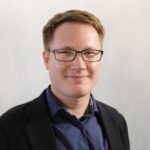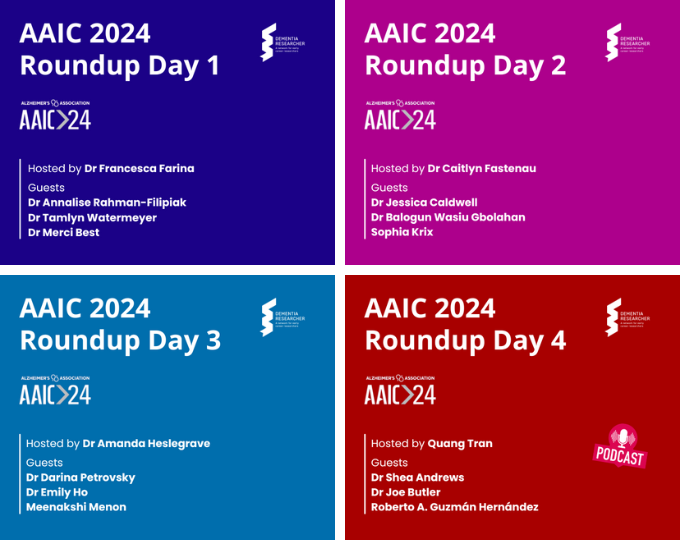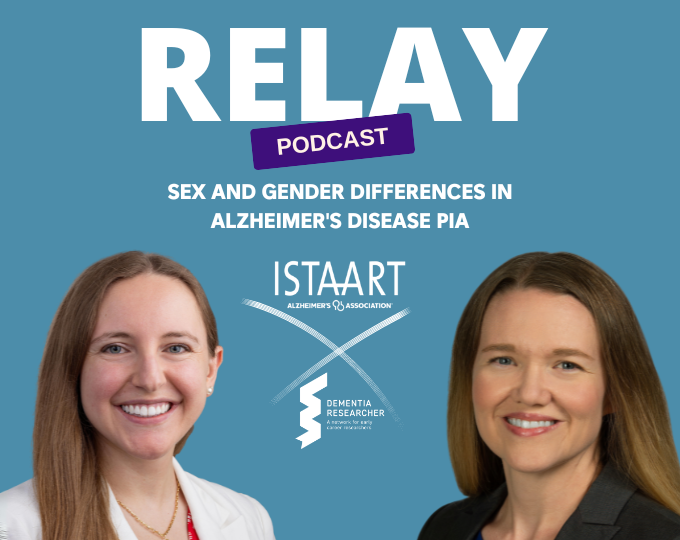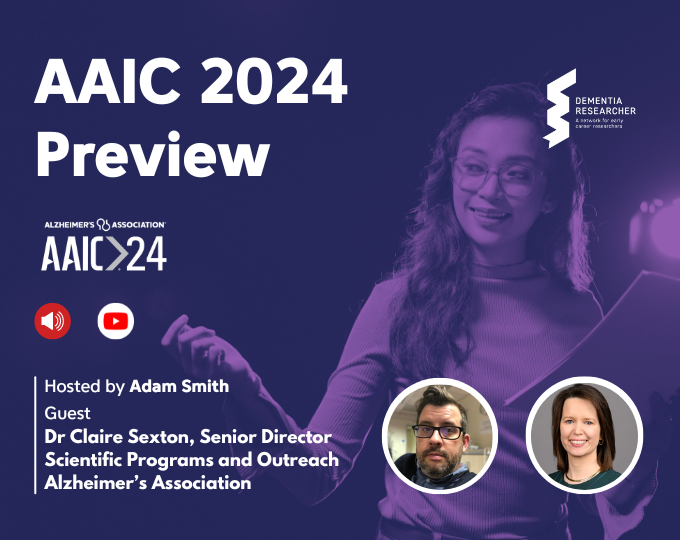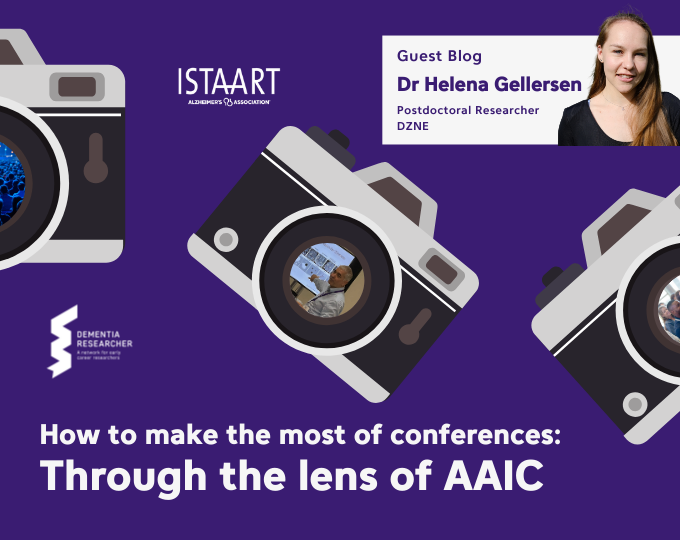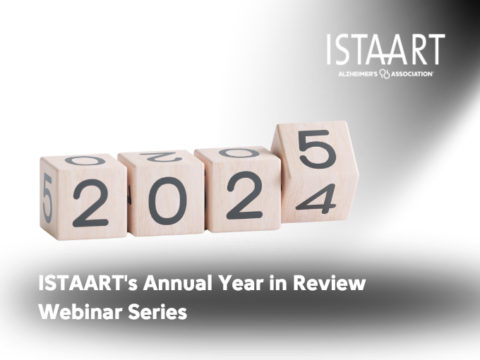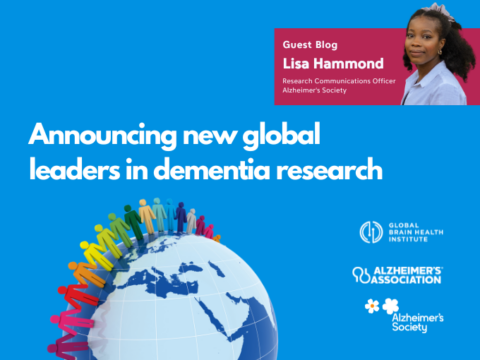In this podcast we share a few selected highlights from the last day of the Alzheimer’s Association International Conference (AAIC) taking place in Philadelphia and Online, 28th July to 1st August.
Quang Tran, Science Communications Officer for Alzheimer's Research UK, guest hosts the show with expert panelists:
- Dr Shea Andrews, Assistant Professor at University of California San Francisco working on Genetic Epidemiology of Alzheimer’s disease
- Dr Joe Butler, NIHR ARC Research Fellow at University of Sunderland, interested in using techniques and paradigms from experimental psychology to learn about brain health.
- Roberto A. Guzmán Hernández, ISTAART Ambassador, Graduate Research Assistant and PhD Student at Temple University working on the effects of aggregated tau on endothelial and cerebrovascular dysfunction
The AAIC brings together distinguished basic scientists, clinical researchers, early career investigators, clinicians and the care research community at the largest and most influential international conference on dementia science. They share theories and breakthroughs while exploring opportunities to accelerate work and elevate careers.
Main plenary talks from the day included Michael Weiner 'ADNI: Two Decades Of Impact And The Path Forward', Reisa Sperling ' Preclinical Alzheimer’s Disease'.
Today was also the first AAIC For ALL, a new format with talks for professional from Jeffrey Cummings on the Therapeutic Landscape, Heather Whitson on The Role Of Blood Tests In Diagnosis And Treatment, Clifford Jack on Criteria For Diagnosis And Staging, Monica Rivera-Mindt on Health Equity And Risk Reduction and Katherine Possin on Dementia Care. Talks for a lay audience from Edward B. Lee on Brain Donation: The Gift Of Knowledge, Hussein Zalzale on The Many Faces Of Alzheimer’s Dementia, Subtypes And Unique Features, Dawn Mechanic-Hamilton on How Can We Improve Cognitive Testing? The Answer May Be In The Palm Of Your Hand, Cerise Elliot on Building Inclusive Alzheimer’s And Related Dementias Research Studies, Wiesje van der Flier on 'Risk Reduction', Jonathan Schott on 'Diagnosis And Treatment', Nancy Hodgson on 'Dementia Care', Ozioma Okonkwo on 'Health Equity'.
Quang Tran:
Hello, everyone. Welcome to the Dementia Researcher Podcast with me, I'm your guest host, Quang Tran, and we are live from the last day of AAIC 2024. So, a bit about me, your guest host. I'm in the science communications team at Alzheimer's Research UK, and my job is just to make exciting dementia research as accessible as possible, and what guests we have to do that today. So welcome both, thank you, well, three of you. Thank you all for coming. Let's start. Let's do some introductions, shall we?
Dr Joe Butler:
Sure. So, my name is Joe Butler, and I'm basically at University of Sunderland in the northeast of England where I'm currently an NIHR Applied Research Collaborative Fellow, and I'm working on remote digital tools for the assessment of Alzheimer's disease.
Quang Tran:
Oh, wow.
Dr Joe Butler:
So that's also the poster that I presented on Monday where we remotely collected data using our digital biomarker, the visual short-term memory-binding task and then used machine learning to identify the predictors of performance on what influences how you perform on this task, whether you're a good performer on the task or whether you're a poor performer on the task.
Quang Tran:
Excellent.
Dr Joe Butler:
Yes.
Quang Tran:
Amazing, and you are?
Dr Shea Andrews:
Yeah, I am Shea Andrews. So, I'm an assistant professor within the Department of Psychiatry at the University of California San Francisco, and I'm a genetic epidemiologist. So, a lot of the work in our lab is looking at how genetic, environmental, and social drives of health influence the pathogenesis of Alzheimer's. So, my lab had several posters here at AAIC, so on Tuesday-
Quang Tran:
Several?
Dr Shea Andrews:
Yes, my data analyst, Anna, she was presenting a poster looking at the ancestry-specific effects of APOE on biomarkers and other AB risk factors. So, we've previously observed that there's ancestry-specific effects on clinical diagnosis as just recapitulated in other biomarkers and whether that could then affect biomarker tests later on.
Quang Tran:
All right.
Dr Shea Andrews:
My RA, Adrita, she was presenting a poster looking at making a biomarker for mitochondrial dysfunction based off mitochondrial DNA, so this is a little tiny wet lab project. And then yesterday, I presented my poster. So this is looking at how we can integrate genetic risk factors, so monogenic, polygenic risk scores, family history with clinical risk factors with the idea that we could provide patients and healthcare providers with a genomic-informed dementia risk report saying, "This is your genetic liability for Alzheimer's and these are the clinical risk factors you have that you can intervene on to promote brain health." And critically within all this, making sure that this personalised medicine approach is equitable, so it is generalizable across diverse populations.
Quang Tran:
That's great. Yeah, I think you've got some popular topics from this year's AAIC, so it's great back there.
Dr Shea Andrews:
That's how you get funding.
Quang Tran:
Great, and this is Roberto on the end here.
Roberto A. Guzmán Hernández:
So, I'm Roberto Guzmán-Hernández. I'm originally from Puerto Rico, currently based here in Philadelphia. I am a fifth-year PhD candidate in Dr. Silvia Fossati's laboratory at the Lewis Katz School of Medicine at Temple University. My interests are mostly in tau and the vasculature, and I presented a poster yesterday that looks at the effects of protofibril tau inducing metabolic alterations in nanotheal cells. That leads to pro-inflammatory phenotypes, culminating in a loss of barrier resistance. So that would be previous to the widespread blood-brain barrier damage that we see in AD.
Quang Tran:
Brilliant. Okay. Well, I think that's intros-
Roberto A. Guzmán Hernández:
Oh, and I'm an ISTAART Ambassador for this year.
Quang Tran:
An ISTAART Ambassador?
Roberto A. Guzmán Hernández:
Yes.
Quang Tran:
Oh, great, and you're repping the T-shirt as well.
Roberto A. Guzmán Hernández:
I'm repping the purple shirt, yes.
Quang Tran:
Oh, I see. Yes, wow, true ambassador. Very nice.
Roberto A. Guzmán Hernández:
Of course.
Quang Tran:
All right. Okay. So that's the intros done, I think. Now let's talk into about our highlights from the conference. Let's start with Shea. You talked a bit about risk factors and things like that. That's been really popular at this conference. Has that been one of your highlights?
Dr Shea Andrews:
Yes, definitely. So, the Lancet Commission put out their new report yesterday. So, they've previously done one in 2016, one in 2020, and now this is the third version of it. So, they've identified two new novel risk factors that they think can be intervened on, so this is LDL cholesterol levels and visual loss. So previously they had another twelve, like educational attainment, BMI, air pollution, and they looked at the prevalence of these risk factors across the population and their relative risk to estimate the population in tubal fraction. If we could remove all these risk factors, how many dementia cases could be removed essentially or reduced? And they estimate if we got rid of all fourteen of these risk factors, we could remove nearly 45% of AD cases.
So, this is, again, really highlighting that while we have these therapeutic drugs, we also population-based health strategies, statins, having mandated educational attainment. Factors like that can really drive dramatic reductions in risk. But I think the other thing that they really highlight that this isn't equal across communities, so particularly different countries have different risk factor burdens, and even within a country, different racial and ethnic groups have different, again, risk profiles. And also, I think as it was really highlighted in the plenary lecture, differences across educational attainment and socioeconomic status, that has a huge effect on the kind of risk factors we want to be looking at to design those personalised medicine approaches.
Quang Tran:
Great. So yes, let's talk more about that. What did you think when you found out that it was up to it could be, well, in this study in particular, up to 45% of cases?
Dr Shea Andrews:
We've already seen this declining incidence in the rate of dementia. Prevalence is still increasing 'cause we're having an increase in the ageing population, but the actual incidence itself is decreasing. And potentially this is due to better cardiovascular health profiles and also better educational attainment, particularly among women within that age group. So yes, it really highlights that primary prevention is really the way that we can reduce risk, not just this tertiary prevention using monoclonal antibodies, which have huge costs and definitely aren't available across worldwide populations. They're really designed for high-income countries rather than low to middle-income countries.
Quang Tran:
Yes, it was. I think, yes, particularly people at Alzheimer's Research UK, we found it very exciting that we can present well up to half of these dementia cases can be prevented for all the different steps that you could take to do them. There are fourteen of those.
Dr Shea Andrews:
Yes, and most of them have therapeutic reading, statins for cholesterol, antihypertensives for hypertension. I think even so just treatment of depression, quitting smoking, we already have a lot of these interventions that we can implement at a population level, which is pretty cool.
Dr Joe Butler:
Great. I think it's interesting. So, I really like the fact that there's modifiable risk factors, but I think one of the posters I saw yesterday, which was Lena Hofbauer and Francesca Rodriguez, so they looked at the effect of mediating effects of lifestyle activities on cognition, but also social deprivation-
Dr Shea Andrews:
Yes.
Dr Joe Butler:
... within that. So actually, what was really interesting with that poster is that the mediating role of lifestyle activities, it was there, but it wasn't as big an effect as the social deprivation aspect. And the authors spoke about how potentially that could result from systemic and structural factors that may actually prevent individuals from being able to take up these lifestyle modifications as well. And I guess within that it's also, I think on one level it's really great on a policy sense.
So, health economics, you can say, "Great, we reduce 50% of these cases and that's going to be huge savings, reduce the burden on the healthcare system," and stuff like that. But I think at the individual level, there's possibly a risk of healthism and thinking that it's your fault kind of thing. So, I think actually as scientists when we're communicating these two individuals, communicating this to the public is probably also worth doing it within the context of these other factors as well. But if you reduce all of those, then it's still almost chance whether you get it or not. That's how I interpret the...
Dr Shea Andrews:
Yes, there's definitely a huge gap within the Lancet Commission, which is the social determinants of health. And that's because a lot of the studies they're basing their recommendations on, they just haven't had long 10-year, 20-year studies on these social determinants yet. So yes, that's a huge omission within this report at this stage. And also, even though genetic risk factors aren't modifiable, they also influence these pathogens. So, what's the interaction between these modifiable risk factors, the social determinants of health and the genetics? I think it's important to have all three of those together. Not a lot of people are doing that.
Quang Tran:
Great stuff, and how's this study inspired any of you to take actions towards your brain health?
Dr Joe Butler:
From the old paper, I already started doing that after, hopefully this isn't too much of a tangent, but I had a bit of a health scare back in the UK... not a health scare, but I had my NHS MOT before Christmas. I got told off by my GP, basically, have made some lifestyle modifications, mainly going over to a plant-rich diet, which I found quite difficult to stick to while I've been here. And then when I got retested, actually a bunch of my measures that had gone down, LDL cholesterol being one of them actually. So, it's gone down and I'm just on the slightly high for normal, on the cusp, whereas before, it was very high. So yes, I've also seen the effect of following these.
Dr Shea Andrews:
Right. I think definitely with the promoting brain health deal, one of my favourite exhibits within the hall was the portable MRI scanner where you could get your brain scanned. So, I got that done. I do have a brain. There are no goldfishes in there.
Quang Tran:
Great.
Dr Joe Butler:
It's an MRI?
Dr Shea Andrews:
Yes.
Dr Joe Butler:
So, you've got a-
Dr Shea Andrews:
Yes, it's just like a little portable MRI. You just put your head in there and 2 1/2 minutes later you get a brain scan. They're designed like trauma rooms where you can actually just wheel this around to the patients rather than taking a patient to the MRI machine. So, it was hyperfine sweep, but yes, it was really cool.
Dr Joe Butler:
It fits into... sorry if I just cut off.
Roberto A. Guzmán Hernández:
No, the implications for technology like that are great for underprivileged countries. And being able to take a portable MRI scanner to people who cannot physically go out to take an MRI would be a very great advancement to detect very early cases if needed.
Dr Shea Andrews:
Yes, and definitely, as we suck in blood-based biomarkers that can be done within rural communities and representing communities. We're bringing this AD research out to the community rather than bringing the community to us. As I say, only some people can actually come into the community 'cause they can't get time off from their jobs. They don't have the financial means to get to a hospital. So definitely having these technologies to go into the community is huge.
Roberto A. Guzmán Hernández:
Since you mentioned the community, today was the first time that there was AAIC For All, which was open to the community. I know Joe went to one of the sessions.
Dr Joe Butler:
Yeah, I went to it this morning. It was excellent to see actually, to see members of the public engaging with this 'cause I think that's who we serve ultimately at the end of the day. It's these people and our research exists because of they're also taking part. It was quite a moving moment from one of the points where I saw, I think it was somebody on the panel said that they were a carer for somebody with Alzheimer's disease and they were taking part in research, not for themselves, but for their children and grandchildren when they're old, so accepted the outcome, but it's like, "This is why I'm doing this to help." That was very powerful. It was quite hard not to feel the emotions at that.
Roberto A. Guzmán Hernández:
Everything we do at the end of the day is for the future. It's not something necessarily we're going to see, but hopefully the future generations are going to have a better outlook over that. And the two plenaries today were very carefully tailored to also be accessible to the community that was visiting today. So, I found that a very nice touch to end the conference.
Dr Joe Butler:
When everyone stood up, and I'm sorry, when people clapped the participants and their family members as well. That was amazing.
Dr Shea Andrews:
Yeah, AAIC For All is definitely a highlight. My wife is here, and she attended it. She doesn't know anything about Alzheimer's or medicine, but you're having this opportunity to come in and see what other researchers are doing and aimed at the community to make it explainable to them so they can understand it. That's a huge thing. Public outreach is important.
Quang Tran:
That's great. That's great. So yes, Roberto, do you have any highlights from the conference that you want to touch upon
Roberto A. Guzmán Hernández:
Full disclosure, I am completely biassed towards tau and the vasculature, and I'm a basic scientist. I found that there's been an increase in posters regarding Tau and the vasculature overall, which makes me very happy. But one of the things that I've noticed overall is that there's an interest, a very, very high interest in looking as closely as possible at events that happen at the molecular level. I wanted to highlight a talk by Rachel Bennett. It was two days ago in the morning. They had this really neat paper that came out this year where they took control in AD patient brains, and they were able to clear the tissue, stain it and obtain very high-resolution images of tau next to the vasculature.
And that's one of the greatest indicators that we have, that sort of pathology. And that went a little bit on yesterday's plenary by Dr. Tara Spires-Jones, where they have this very high resolution of what's going on at the synapse with tau. So just being able to see the images, I'm also a very high fan of images in papers. I love being able to actually see what's going on. That interest in understanding very deep down what's going on at that very resolute level, I think it's been a fantastic highlight, at least for us basic scientists.
Quang Tran:
Yes. Yes. Where do you see the future of tau research leading to?
Roberto A. Guzmán Hernández:
I know there's a big increase in looking at tau as a biomarker, particularly 217, there's been a lot of sessions. There was a very interesting talk today by Eleanor Drummond, actually, about 217, that they pulled down with that antibody against 217 and saw the interactome. And particularly they found that it interacts with the E3 ubiquitin ligases, one of the subunits. So, it would be for targeting a specific degradation of phospho-tau. So, I know it's going to be a very big biomarker movement, particularly in the blood and early detection would be the key. Of course, 217 is an indicator of amyloid pathology a bit later on, so I believe that's where it's going to move a little bit forward. And also, in finding tau in places it's not thought to be at, I think that's where the periphery is also what we're going to be looking at in a few years.
Dr Joe Butler:
So I think that's really interesting because the behavioural task that my group works with, the Visual Short-Term Memory Binding Task, there's evidence, and that was what the analysis that we showed on Monday, actually, we did a behavioural analysis, but based on existing research that essentially your performance on this task is influenced by tau. So, it's really cool that we've developed a remote version and then you can generate large data sets. Like we collected 370 participants over the space of 12 months just by sharing around social media. And then you can use that to identify these poor performers and then generate hypothesis from that. So, it's not fantastic data 'cause it's essentially collected from Facebook. But then you've got this big, massive data set that you can then start to look at things, perhaps lifestyle factors and stuff like that that you can then take further. I think that's also where the future maybe is of ways where you've got these proxy measures of the... Yes, and then you can follow up with that and then take it into the lab from that.
Roberto A. Guzmán Hernández:
That's so very interesting seeing it progress over the next couple of years.
Quang Tran:
It has. Well, yes, particularly that p-tau217, that's really come out just arms swinging really in the last few years. It's a really hot topic.
Dr Shea Andrews:
Definitely, as we saw in the last plenary, p-tau217 age and APOE is like 95% accuracy for-
Quang Tran:
95%.
Dr Shea Andrews:
... and with positivity-
Dr Joe Butler:
Wow.
Dr Shea Andrews:
... that's huge.
Quang Tran:
It's very promising, isn't it?
Dr Shea Andrews:
Yes.
Quang Tran:
Oh, lovely. So, Joe, what highlights do you have from this conference?
Dr Joe Butler:
I think 'cause quite new to this space and my background's experimental psychology where it's traditionally been quite dry research where you just get people sat in a room making eye movements for three hours and you measure what you can see in that, and the applicability of that isn't really immediate. So, I've also not had that training, so working with members of the public. And what's really been useful for me this year is getting involved with the peers and also attending some of the ISTAART training as well, and also the pre-conference stuff, so I really enjoy it.
And some of it's been quite profound, I think, on the way that I think about things now. So, the leadership training and skills development on Thursday was really, really good. I'm rubbish with names, but there was a four-person panel of very credible senior scientists, and the thing that came away for me that I'd never heard before was this servant leadership or this leadership of servitude where you're essentially serving the people that you are doing the research for, the people that you collaborate with and the people in your lab. And just, it's made me think a little bit more as my career develops this type of leader that I'd like to develop into.
But then also some of the other sessions like working with research participants and thinking about... So, we were given a sheet with information about a study and just thinking about how that may not be very good to people that say they have problems with reading or vision or perhaps they've got sensory issues with hearing and stuff like that and just about tailoring it to those individuals. Then some of the other sessions like working with using AI in your research from analysis to ChatGPT, and then also effective science communication as well, which was really, really good as well. So, I think that's what I've enjoyed most. The science and stuff's been interesting, but I also think the training that's being available here as well.
Quang Tran:
Oh, that's great.
Dr Joe Butler:
Yes.
Roberto A. Guzmán Hernández:
How do you think AI is going to play in the near future? 'Cause I know it's a very controversial topic at the end of the day.
Dr Joe Butler:
Something I have, 'cause I've [inaudible 00:19:36] since I presented a poster on Monday using AI, but I don't actually have that much of an understanding of what was done. So, it was done by a collaborator, Sammmy Denzo, who's also one of Bill Gates AI fellows. So, he knows what he's doing, I would assume. But it is going to be useful for picking out these patterns in these data sets that you might not necessarily get with, say, frequency stats and stuff like that at, and yes, just new ways of looking at data as well. But then I also think even with things like the ChatGPT and stuff, so I tend to use that on a daily basis but more as something to just bounce ideas off or generate ideas or to give feedback on, say you write a manuscript and then getting feedback and stuff like that. So, I think it's going to help the science that we produce, but then it's also going to be part of the science that we produce, if that makes sense.
Dr Shea Andrews:
Yes. While we have AI tools that query all these big data like electronic medical records, UK Biobank, all of us, what's often missing if you just have a newcomer coming to the field without that domain expertise, they find all these correlations that aren't necessarily biologically plausible. So, you get overwhelmed by those associations. Then you need a domain expertise to pass what's actually worth following up on. So again, AI is not going to replace us, I don't think. Right?
You still need the human in the middle to go through and say what is actually important to the research we're doing, and yet more critically, actually designing what that research is. At this stage, AI can't tell us what the research questions are. That's where the human creativity comes into. But yes, I use ChatGPT every day. I mostly use it to help with grammar and syntax and stuff like that. So it made me feel like I'm okay with you using ChatGPT to help you write a manuscript, but that first draught has to be yours, and you have to ask... not just get ChatGPT to fix the grammar, but actually tell it to explain to you why it's making those changes so you're learning from it. So, it's to help teach, not just to blindly copy and paste.
Dr Joe Butler:
I like that you can also fix the prompts to give them a backstory, I guess. So, you're an eminent professor in this field, "Please read through this recent manuscript and give me feedback."
Dr Shea Andrews:
So, they're currently testing in different prompting techniques, and apparently that doesn't work so well in the newer versions of ChatGPT Like, it worked really well on version 3, but the latest-
Dr Joe Butler:
Take a deep breath was one as well, I heard-
Dr Shea Andrews:
Yes.
Dr Joe Butler:
... before... Yes.
Yes.
Dr Shea Andrews:
So yes, that's rapidly changing every day too, which is cool. But I didn't see too much AI stuff here, at least not the sessions I went to.
Dr Joe Butler:
No. So there were a few papers where they'd used it for analysis, and it was just the, ISTAART training on using it, which was nice for an overview, I think, and maybe encourage people to use it within the limitations.
Dr Shea Andrews:
Yes, another example, actually, so at the start of this month, I went to another conference on the Science of Science and Innovation, and there was a lot of AI stuff there. But one of the examples there was they're doing more qualitative research on asking researchers how they're using ChatGPT. The person doing the research actually does, it was cardiovascular research with a specific statistical analysis and specific instruments. And one of the people was asking ChatGPT how to this analysis and was just giving default values that actually didn't make sense. Again, just copy and pasting the code without understanding what those values are or why they were chosen and how that can then influence your results so that critical thinking that goes into the actual analysis that you're doing.
Dr Joe Butler:
The human theoretical expertise is required to... almost as if you were asking an intern to do something for you, it has to be sanity checked before you-
Dr Shea Andrews:
Yes.
Dr Joe Butler:
... throw it into the wild at least.
Dr Shea Andrews:
Yes. Yes. Yes.
Quang Tran:
Yes, that's right. Yes. One of the things that I found with ChatGPT was that it did it forecasting where it just pulls out these studies from thin air and uses it in your-
Dr Joe Butler:
Hallucinations, exactly.
Quang Tran:
Hallucinations, that's it. Yes. So that's one problem I ran into, but I do think it is a very useful tool. Yes, it does well.
Dr Joe Butler:
The new version does access the internet now, so you'll ask it a question, you'll see it doing the little spinning circle while it says it's accessing the internet and showing you where it's searching, which is-
Quang Tran:
That's very exciting.
Dr Joe Butler:
Yes.
Dr Shea Andrews:
Yes. Maybe that's a nice segue way into another talk I found interesting, which is actually on scientific fraud.
Quang Tran:
Scientific fraud.
Dr Shea Andrews:
Yes. So, Suzanne Hendrix from the Pentara Corporation, I think they're developing topic session three. So they were actually... have developing this algorithm to basically go through data that's been given back into clinical trials to identify sites where there's actually suspected scientific fraud, where they're either like copying data from the same participant to boost sample numbers, potentially multiple blood samples coming from the same person, the same MRIs, and basically saying if you see people recruiting or enrolling subjects into a clinical trial too quickly, that's very suspect.
But the main fun is that if you rank the effect size of the treatment effect by the suspected site, so the least suspected at the top and the most suspected sites of fraud at the bottom, the effect size tenuates towards the null. So, this is saying there's actually potentially treatment effects for drugs out there that could be real but are actually being hidden by suspected fraud because the treatment effect becomes null by including these suspected sites in there, I think. Again, just highlighting how careful we have to be of the people we're working with and being very critical of the data we're receiving from everyone.
Dr Joe Butler:
This was touched on in the ISTAART Science Communication training actually about so when you do communicate research, you should always put it into context. So, discoveries and known truths should be separated from single studies and not to assume that the people you're communicating with make that distinction. So, for example, if you do have this core finding in a single study and you communicate that to people and it gets out there into the wild and then it does get retracted, it's already out there and it could frighten people or stuff like that. And it's hard to retract back once it's in public domain and becomes common knowledge.
Dr Shea Andrews:
Yes. Yes. Once the science is out there, we can't take it away. We can, but as I said, it's still adding the public [inaudible 00:26:04]
Quang Tran:
It's hard to remove a message, I think. Yeah-
Dr Shea Andrews:
Yes. Yes. Yes. Yes.
Quang Tran:
... hard to change, but yes. And Shea, you've just come from the plenary session now we just had.
Dr Shea Andrews:
Yes. Yes. It was two really great plenaries. Of course, we got Mike Weiner, who's from UCSF as well, gave a fantastic overview of the major contributions ADNI's had to AD research. So, this has been going on for over a decade, so it's going into their ADNI 4 data now. So, the ADNI 1, 2 and 3 were really focused on identifying novel biomarkers for Alzheimer's disease, particularly CSF and PET imaging biomarkers, and now blood-based biomarkers. But one of the highlights, or one of the things that Mike really highlight as a limitation of ADNI, particularly ADNI 1 to 3 was the lack of diversity.
So, it was very much a white, non-Hispanic, Latinx white cohort. So ADNI 4, they really brought in a new diversity task force to make sure that they're enrolling more diverse participants. But even then, there's still other issues around generalizability, particularly around education and socioeconomic status. So, most people who enrol within ADNI have a college degree and also tend to come from a higher socioeconomic status. So, it's great to see that those changes have been made to increase diversity, but there's still, of course, more to do in the cohorts that we're recruiting.
Dr Joe Butler:
What really stood out about me for the ADNI talks, as I say, I'm new to the field and just learning about this bio side, but it fits in with also one of the plenaries yesterday about lower to middle income countries and their involvement in research. The fact that the data's available as well without requests that anyone can just access it, and that's led to 6,000 publications. Okay, so they were addressing the lack of diversity within the sample, but by making this data available, it enables more lower to middle income researchers to actually access this data and to churn out good papers and stuff like that as well. So that was something that really stood out for me in the ADNI plenary.
Dr Shea Andrews:
Yeah, I've heavily used ADNI throughout my PhD, postdoc and now it's starting in labs, so it's fantastic.
Roberto A. Guzmán Hernández:
The very brief snippet that I loved was when he was talking about, he himself as a patient of ADNI when he had the little photos of himself taking the blood test and the condition test. And it was like there is this great belief in what the ADNI can do and how it should keep going for the future.
Dr Shea Andrews:
Then, of course, Reisa Sperling's plenary talk is also fantastic, so more focused around preclinical AD.
Quang Tran:
Okay.
Dr Shea Andrews:
So yes, ADNI, of course, is very focused on symptomatic AD, but they also have this preclinical stage where we've got the buildup of amyloid, particularly amyloid up to 20 years before clinical symptomology. So, the A4 study, and now I think doing A3, A2, APEX, she's got a lot of studies going, but really highlighting that this early removal of amyloid can dramatically reduce the risk of progressing towards MCI and developing amyloid-positive or cognitive decline in the future. So, whether this is through secondary or tertiary prevention, and I think where she was going for A2, and A1 studies is primary prevention through risk reduction.
Dr Joe Butler:
I think the idea around... this starts decades before, so the data we presented, we didn't make a big point of it. But actually, the mean age of it was 28 years old, which possibly would have been more controversial. Obviously, we're going to investigate it. I'd like to follow it up with a grant to have a look at the biomarkers. But there was also, it was Monday, somebody presented some data where they found independent effects of loneliness on memory independent from depression. And the mean age of that data set was 44 years old as well. So, it's just like actually there's this evidence indicating that you go, yes, that it's middle age or even before perhaps is when people should start thinking about this.
Quang Tran:
Great. So, one of these things that this alludes to is, you alluded to it before about the need to recruit more into these clinical trials taking place around the world. I found it quite striking in Jon Schott's talk yesterday when he said that we need just over 50,000 participants to take part in clinical trials just to be comparable to what's going on in cancer at the moment. And I found it really interesting talking about the challenges of recruitment. He went through what kind of obstacles there are, what kind of preconceptions that people have about clinical trials.
Dr Joe Butler:
"Is research for me? Am I one of these that should take part?"
Quang Tran:
Exactly. I just wondered if you had any thoughts on what needs to be done in that clinical trials field. Did you go to Jon Schott's talk and-
Dr Shea Andrews:
I didn't personally myself,
Quang Tran:
Okay.
Dr Shea Andrews:
... but definitely, we need to enrol more people into clinical trials, have broader generalizability across the populations. I don't think it's that much of a reach, right? People do sandmen just for curiosity, so I think it's reaching out to people like that who want to be involved in research. And of course, the people who can actually then take place in research may be different from the populations that we need to target, so we've got to get that balance right too. Of course, the biobanks are really going to really help with this too. All of us is recruiting a million people. The Mount Sinai Biobank, they're aiming for a million people now as well just completely within their own healthcare system within New York. So, I think then the issue is going to be collapsing all these biobanks together and actually sharing data between biobanks.
Quang Tran:
Yes, and also the survey that you did talking about what kind of things that people think about when they take part in a clinical trial like, "How long is the clinical trial take place? How often do I need to go to the clinic?" This all raised interesting questions about how we are going to, well, work harder in these clinical trials to recruit them. And I think if you do catch up on that, if you do listen to that too, Jon Schott's talk, which all of these talks are available to listen back to for 30 days if you've registered for AAIC, and so-
Dr Shea Andrews:
Yes, definitely one of the talks that I saw people were mentioning on Twitter that I missed was around this issue of brain volume shrinking when they're being placed on the Lecanemab. At least there was a talk suggesting that this is predominantly due to amyloid beta parts been removed and reduction in inflammation, which does seem to make sense because there was this paradoxal, like we're moving the amyloid plaques, but the brain is shrinking. Like, is this bad? And this seems to actually... no, it's probably a good thing. It's highlighting that we're getting rid of the plaques and helping to prevent cognitive decline. But yes, I need to go back and listen to that.
Roberto A. Guzmán Hernández:
Yeah, I was able to go yesterday touching on how complex it is for clinical trials. I was able to go for a bit to the Sprint Mind Session yesterday in the afternoon, and I believe the study had around, almost 10K people. But how the mortality rate that happened naturally greatly affected the outcomes that they had at the very beginning monitoring phase and how the changes were actually seen in the 10 years post their initial observation period. So, it would be an issue with number, but they made a really great emphasis on how that number really affected.
Quang Tran:
Great. All right, so wrapping up then. So, what have you been your key takeaways from this conference so far? It's been the last day. We've come to the end of it. What did you think? Let's start with Joe.
Dr Joe Butler:
Just about bringing more diversity into the research, the participants, so as the data sets are more applicable to different populations, taking into consideration those systemic factors that may stop people from being able to participate in modifying risk factors and stuff like that. So, I think that, yes, for me it's been around the equity.
Quang Tran:
Amazing.
Dr Shea Andrews:
For me, it's definitely probably the combination of the Lancet Commission report with Reisa Sperling's talk really highlighting that these population prevention strategies can probably really influence this preclinical stage of Alzheimer's disease and promote brain health for risk reduction. But again, making sure that we have those equitable personalised medicine approaches for doing that.
Quang Tran:
All right, Roberto?
Roberto A. Guzmán Hernández:
Well, that's it. I think the main takeaway has been the importance of looking at the earliest changes possible and how all of these affect 20 years before, 10 years before the pathology that we see now. So, I think that's going to be one of the main things for actually next year how people are going to be looking at earlier pathology, particularly in the basic sciences part. I think it's moving a few decades back in time to see what early changes are going to be the pathology that develops.
Quang Tran:
Great. Yes. My takeaways, yes, I think I'm definitely going to certainly look more into vision loss. I think I can't take my health for granted at this stage. I think I don't really do those medical check-ups like GPs recommend. Yeah, I think that's definitely something that I will take away. There are loads of resources that are out there. Outsiders Research UK recently uploaded their Think Brain Health Check-in where you can do this online survey/quiz to talk about the steps you can take where you can improve your brain health. That wraps up this episode of the Dementia Researcher Podcast. Thank you so much for listening. Thank you all of you for joining me today.
Dr Joe Butler:
Thank you.
Quang Tran:
It's been a really great conference. I've had a really good time with that. So, if you are registered at the AAIC Conference, you can listen back to the talks for 30 days after the AAIC finishes. But yes, thank you very much. This has been the Dementia Researcher Podcast.
Voice Over:
The Dementia Researcher Podcast was brought to you by University College London with generous funding from the UK National Institute for Health Research, Alzheimer's Research UK, Alzheimer's Society, Alzheimer's Association and Race Against Dementia. Please subscribe, leave us a review, and register on our website for full access to all our great resources, dementiaresearcher.nihr.ac.uk.
Enjoyed the podcast? Please review, like, and share - and don't forget to subscribe to ensure you never miss an episode.
If you would like to share your own experiences or discuss your research in a blog or on a podcast, drop us a line to dementiaresearcher@ucl.ac.uk
Did you know... you can find our podcast in your favourite podcast app on mobile devices, and our narrated blogs are also available as a podcast.
This podcast is brought to you in association with the Alzheimer's Association, Alzheimer's Research UK, Race Against Dementia and Alzheimer's Society, who we thank for their ongoing support.
The views and opinions expressed by the host and guests in this podcast represent those of the guests and do not necessarily reflect those of UCL or Dementia Researcher

 Print This Post
Print This Post
